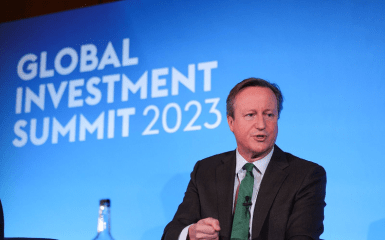Britain is ready to loan Ukraine all the frozen assets of Russia's central bank in Great Britain because Russia will be forced to pay reparations to Ukraine after the end of the war.
Britain can loan Russia's frozen assets to Ukraine
This was announced by the British Foreign Minister David Cameron. He said the assets would be used as collateral for the payment of reparations.
There is an opportunity to use something like a syndicated loan or a bond that effectively uses the frozen Russian assets as a surety to give that money to the Ukrainians, knowing that we will recoup it when reparations are paid by Russia. That may be a better way of doing it. We are aiming for the maximum amount of G7 and EU unity on this but if we cannot get it I think we will have to move ahead with allies that want to take this action.

David Cameron
British Foreign Secretary
Cameron said he did not believe the bond plan would in any way undermine London's reputation.
The Guardian notes that this is the first time Cameron has spoken in detail and openly about the proposal. This probably underscores the political support for the plan in the US but not in the EU.
The plan will be especially useful for Ukraine if the US Congress continues to block aid to Ukraine.
However, such a proposal is weak in that it assumes that a defeated Moscow will be willing to pay reparations for the damage it has done to Ukraine, which does not seem likely at the moment.
Confiscation of assets of the Russian Federation: what is known
The Guardian notes that Britain's plan is more radical than the proposals discussed in the European Union.
There, they offered to give Ukraine only profits from the assets of the Russian central bank, which the West owns. The annual excess profit is estimated at 4 billion dollars.
In general, the G7 has been discussing for more than a year whether it is possible to confiscate the assets of the Russian central bank without undermining faith in the international financial system.
According to EU estimates, about 260 billion euros of Central Bank of Russia's assets were frozen in the jurisdictions of G7 partners, the EU and Australia.
Belgium is believed to control as much as 190 billion in assets held in its euro-denominated clearinghouse and is the most reluctant follower of Cameron's radical plan.
The US has between $40 billion and $60 billion in Russian assets, and the UK about £25 billion, but no official figure has been released.



